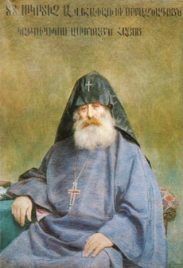Mkrtich Khrimian
Monday, July 19, 2021
Mkrtich Khrimian (4 April 1820 – 29 October 1907) was an Armenian Apostolic Church leader, educator, and publisher who served as Catholicos of All Armenians from 1893 to 1907. During this period he was known as Mkrtich I of Van (Մկրտիչ Ա Վանեցի, Mkrtich A Vanetsi).
A native of Van, one of the largest cities in Turkish (Western) Armenia, Khrimian became a celibate priest (vardapet) in 1854 after the death of his wife and daughter. In the 1850s and 1860s he served as the abbot of two important monasteries in Turkish Armenia: Varagavank near Van and Surb Karapet Monastery near Mush. During this period he established schools and journals in both monasteries. He served as Patriarch of Constantinople—the most influential figure within the Ottoman Armenian community—from 1869 to 1873 and resigned due to pressure from the Ottoman government which saw him as a threat. He was the head of the Armenian delegation at the 1878 Congress of Berlin. Returning from Europe, he encouraged Armenian peasants to follow the example of Christian Balkan peoples by launching an armed struggle for autonomy or independence from the Ottoman Turks.
Between 1879 and 1885 he served as prelate of Van, after which he was forced into exile to Jerusalem. He was elected as head of the Armenian Church in 1892, however, he was enthroned more than a year later and served in that position until his death. He opposed the Russian government's attempt to confiscate the properties of the Armenian Church in 1903, which was later canceled partly due to his efforts. Khrimian further endorsed the liberation movement of the Armenian revolutionaries.
He is a towering figure in modern Armenian history and has been affectionately called Khrimian Hayrik (hayrik is diminutive for "father"). A well-known defender of Armenian interests and aspirations, his progressive activities are seen as having laid the groundwork for the rise of Armenian nationalism and the consequent national liberation movement of the late 19th and early 20th centuries.
Early life, education, and travels
Khrimian was born in the Aygestan (Aikesdan) quarter of Van. His father, a weaver, died when Mkrtich was a child and he was brought up by his uncle, Khachatur, a merchant. The root of his last name, Khrim, is the Armenian language term for Crimea, suggests a link his family had with the peninsula. He received informal education at parochial schools of Lim and Ktuts islands in Lake Van and Varagavank, where he studied classical Armenian, history, and ecclesiastical literature. Upon returning to Van in 1842, he embarked on a journey across the region and made a pilgrimage to Etchmiadzin, the center of the Armenian Church. Khrimian wished to continue his education at a European university, but this desire was never realized. He lived in Constantinople from 1844 to 1846 where he made connections with Armenian intellectuals.
Returning to Van in 1846, he married Mariam Sevikian. In 1847 he crossed to Persia and the Russian Caucasus, where he visited the Ararat plain, Shirak, and Nakhichevan. He lived in Alexandropol (Gyumri) for six months. In 1848 once again moved to Constantinople via Tiflis, Batumi, and Trabzon. From 1848 to 1850 he taught at an all-girl school in Constantinople's Khasgiugh (Hasköy) quarter. In 1851 he traveled to Cilicia where he was sent to report on the state of Armenian schools. By traveling and living in various Armenian-populated provinces, he acquired an intimate knowledge of the problems and aspirations of ordinary Armenians. He was upset with the apathy the upper and middle classes of the Armenian community of Constantinople showed towards provincial Armenians.
Returning to Van in 1853, he found himself with no immediate family left; his wife, daughter, and mother had died. He thereafter decided to devote himself to a life in the Armenian Apostolic Church. In 1854, at age 34, Khirimian was ordained as vardapet (celibate priest) at the Aghtamar Cathedral in Lake Van. In 1855 he was appointed abbot of the Holy Cross Church in Scutari (Üsküdar), near Constantinople. Khrimian began production of the periodical Artsvi Vaspurakan at a publishing house located next to his Scutari church.





